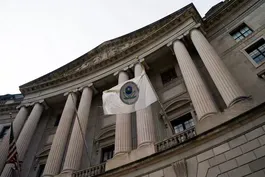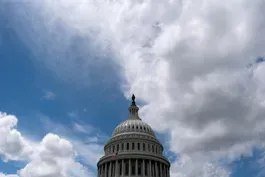
How RFK Jr. is shaping the conversation about autism
Clip: 5/14/2025 | 12m 25sVideo has Closed Captions
How RFK Jr. is shaping the conversation about autism and why advocates are pushing back
Health Secretary Robert F. Kennedy Jr.'s agenda has won praise from some whose loved ones have severe complications from autism. But others say his rhetoric fails to accurately portray people on the spectrum and the contributions they make. We have perspectives from people with autism and their caregivers and Ali Rogin looks at how leaders in the community are advocating for themselves.
Problems with Closed Captions? Closed Captioning Feedback
Problems with Closed Captions? Closed Captioning Feedback
Major corporate funding for the PBS News Hour is provided by BDO, BNSF, Consumer Cellular, American Cruise Lines, and Raymond James. Funding for the PBS NewsHour Weekend is provided by...

How RFK Jr. is shaping the conversation about autism
Clip: 5/14/2025 | 12m 25sVideo has Closed Captions
Health Secretary Robert F. Kennedy Jr.'s agenda has won praise from some whose loved ones have severe complications from autism. But others say his rhetoric fails to accurately portray people on the spectrum and the contributions they make. We have perspectives from people with autism and their caregivers and Ali Rogin looks at how leaders in the community are advocating for themselves.
Problems with Closed Captions? Closed Captioning Feedback
How to Watch PBS News Hour
PBS News Hour is available to stream on pbs.org and the free PBS App, available on iPhone, Apple TV, Android TV, Android smartphones, Amazon Fire TV, Amazon Fire Tablet, Roku, Samsung Smart TV, and Vizio.
Providing Support for PBS.org
Learn Moreabout PBS online sponsorshipGEOFF BENNETT: HHS Secretary Robert F. Kennedy Jr. spent the day testifying on Capitol Hill, where he faced a grilling, as lawmakers pressed him on the Trump administration's overhaul of federal health agencies and billions in cuts to the multiple agencies he oversees.
House Democrats, in particular, raised concerns about whether Kennedy was violating the law in cutting funding appropriated by Congress for medical research this year.
Kennedy said he's streamlining some funds.
REP. ROSA DELAURO (D-CT): Excuse me, but that's B.S.
You are not rescaling NIH research.
You are proposing to cut it by $20 billion.
I want my questions answered on, are you freezing and withholding funding that Congress appropriated in 2025 for lifesaving NIH research?
ROBERT F. KENNEDY JR., U.S. Health and Human Services Secretary: We are not withholding any funding for lifesaving research.
REP. ROSA DELAURO: Do you commit to following the law... ROBERT F. KENNEDY JR.: Of course.
REP. ROSA DELAURO: ... and fully obligating funding that Congress appropriated?
We appropriated.
It is the law of the land for NIH research, and to obligate those funds by September 30 of this year.
Or are you planning to break the law by impounding congressionally appropriated funds?
ROBERT F. KENNEDY JR.: If you appropriate me the funds, I'm going to suspend them.
GEOFF BENNETT: Kennedy's approach to the measles outbreak also came under scrutiny.
He defended the CDC's response, but was pressed by Democrats about his stance on vaccines.
REP. MARK POCAN (D-WI): If you had a child today, would you vaccinate that child for measles?
ROBERT F. KENNEDY JR.: For measles -- probably for measles.
What I would say is my opinions about vaccines are irrelevant.
I have directed Jay Bhattacharya.
ROBERT F. KENNEDY JR.: I don't want to -- so that everybody can make that decision.
But I don't want to seem I'm being evasive.
But I don't think people should be taking advice, medical advice, from me.
GEOFF BENNETT: Kennedy has also been vocal about autism, pledging to create a national database to find, as he says, the causes of autism.
His agenda has won praise from some, including those whose loved ones have severe complications.
But his rhetoric, others say, fails to accurately portray the variety of people on the spectrum and the contributions they make.
Our Ali Rogin has our look at how leaders in the autism community are advocating for themselves.
But let's start with the perspectives of viewers with autism and their caregivers on how they see this moment.
Here's some of what they told us.
KODI CLIFFORD, On the Autism Spectrum: My name is Kodi Clifford.
I'm on the autism spectrum.
As somebody who's late-diagnosed, it's a new prospect for me to be thinking about is how other people see me, how other people are talking about autism issues in the media.
I'm going to try not to get too emotional about it because it is, I think, overall really hurtful.
DORIS SMITH, Mother: My name is Doris Smith.
I have a son, a 30-year-old son named Jacob, who has been diagnosed with autistic behavior.
We see the scratching, the biting, the inability to sleep.
I have got holes in my walls that -- I'm tired of doing drywall.
SHAMIRA CHANEY, Mother: My name is Shamira Chaney, and I have three beautiful, beautiful, awesome sons who are all on the autism spectrum.
I do believe that all of my boys will be contributing members of society.
You know, there were some comments made about, oh, they won't be able to play baseball.
My son Eli runs track, a gold medalist, may I add, in track.
He is a basketball player.
I think he just recently told me "I'm signing him up for soccer and baseball this summer."
So, like, he's thriving.
MICHAEL WILLSON, Neurodivergent: My name is Michael Willson, and I am neurodivergent.
First of all, vaccines do not cause neurodivergence.
We need to end that myth once and for all.
But let's just pretend for a second that they did.
The fact that people would rather have a child dive from a preventable disease than to have a neurodivergent child, it's just really heartbreaking to me.
C.L.
KIEFFER NAIL, Autistic and Diagnosed With ADHD: My name is C.L.
Kieffer Nail, and I am autistic and I have also been diagnosed with ADHD.
For someone to try and put a cap on our limitations and tell us what we are capable of doing, it's insulting.
It's dehumanizing.
All of the language we have heard in the last couple of weeks from RFK Jr., it has echoes of Nazi Germany and wanting to make a list of us.
It's frightening.
So many of us are terrified, both for ourselves, for our family members.
DORIS SMITH: He has certain places he likes to go.
He's Mr. GPS.
So we have to go to those places in a certain way.
God forbid if there's an accident or something is blocked off.
Then we get a rise in behavior.
And that rise in behavior can be everything from having a tantrum to throwing things, to scratching, to repeating things over and over again, to even biting in some cases.
Both of our cars have damage on the inside.
KODI CLIFFORD: There are so many ways that we could be supporting people with autism, rather than focusing our energy on like, do you see that over there?
You don't want your kid to be like that.
How do we research and find out how to never have that happen again?
That just seems really counterproductive to me.
SHAMIRA CHANEY: My daughter, Raelyn (ph), she's not on the autism spectrum, but she is just so good with her brothers.
I overheard a conversation that she was having with her friends.
And they were like, so, OK, so all your brothers have autism.
And she's like, yes.
And the friends are asking like, oh, so what exactly is it?
And she's like, they just do things differently.
They do things their own way.
And she spoke about it in such a positive light.
And so I'm like, if an 11-year-old girl can do it, come on, what -- the politicians, this administration, like, I need you all to get it together.
DORIS SMITH: I am very excited at this initiative by Mr. Kennedy.
This has been a long time coming.
We have got a whole generation, now going into a second generation that has been lost.
And if this were any other concern, there would be programs.
Somebody would be looking into it.
But we're made to accept that these things happen.
It's genetics.
It's the environment.
It's this.
It's that.
Well, show us.
KODI CLIFFORD: There's research that needs to be done into the differences between autistic people and neurotypical people, especially in the way of health care, because I have noticed, in my own journey, no one's doing research on that kind of stuff.
And I think they need to be.
Instead, they're doing research into what causes autism.
MICHAEL WILLSON: I want neurotypical people to know that neurodivergent people have beautiful, productive and fulfilling lives.
C.L.
KIEFFER NAIL: Our brains are wired differently.
We think differently.
We look at the world differently.
Our senses are different.
I mean, that's the difference.
And for them to think that we are a problem that needs to be solved, it -- no.
This is my life.
And to be looked at this way by society, it's insane.
ALI ROGIN: For a look at how members of the autism community see this moment, I'm joined by Zoe Gross, director of advocacy at the Autistic Self Advocacy Network, a nonprofit organization run by and for autistic individuals.
Zoe, thank you so much for being here.
ZOE GROSS, Director of Advocacy, Autistic Self Advocacy Network: Thank you for having me.
ALI ROGIN: When you hear those voices, do they represent part of the range of responses that you and your colleagues are hearing from members of the autistic community?
ZOE GROSS: Absolutely.
I think people have been really upset by the comments that they have been hearing, things about autistic people not being able to do certain things, talk like autism destroys families.
No one wants their disability to be stigmatized.
No one wants to be blamed for things going wrong in their family or in society.
It's very distressing to hear that kind of thing.
And there's a lot of mistrust of the data collection effort that's going to be going forward.
ALI ROGIN: Yes.
And let's take a step back, though, and talk about just what is autism spectrum disorder.
This is a wide spectrum we're talking about.
ZOE GROSS: Sure.
So autism is a disability that we're born with and it affects us our whole lives.
It affects how we think, how we move, how we learn, how we see the world, how we process sensory information.
It affects the way we -- our brains organize information.
It affects our communication.
We may not speak or we may speak using scripts or a device.
It affects the way we socialize with other people and it affects that we may need help day-to-day with things like dressing, bathing, or daily routines.
ALI ROGIN: And HHS Secretary Kennedy said recently -- and I'm quoting from him now -- "Most cases now are severe; 25 percent of the kids who are diagnosed with autism are nonverbal, non-toilet-trained and have other stereotypical features."
Does that match what your organization tracks on this level?
And, also, does it represent the perception and the experience of some parts of the autism community?
And I'm wondering if you can speak to that as well.
ZOE GROSS: So, what he's referring to is that the CDC did a study which showed that, of all autistic people, 25 percent either are nonspeaking, are minimally speaking, or have a measured I.Q.
that's under 50.
Now, it's very difficult to measure the I.Q.
of many autistic people reliably.
So take all this with a grain of salt.
But it's that group of three different populations that he's grouping together.
And when he says no one in that group is toilet-trained, there's no studies to back that up.
And to make other generalizations about that group I think would be unwise.
All we know about them is those three things.
And what he's trying to do is to inspire panic and fear and make people very worried about the possibility of autism in their family or just about autism in society.
And that doesn't help autistic people.
ALI ROGIN: We are in a moment where there's a lot of talk about what the government can and should do when it comes to autism.
So where do you come down on this?
What should the federal government be doing?
Where are there more resources needed and where can government play a role, in your view?
ZOE GROSS: So one of the biggest ways that the government could help autistic people today is by expanding Medicaid home and community-based services.
This is a waiver service through Medicaid.
States are not required to provide it.
So, when there are cuts to Medicaid, this is the first thing to go.
But these are the services that help people live their daily lives, help people live in the community, do things they need like transportation, help with daily routines, shopping, cooking, other stuff that means that they can live in their own home, instead of in an institution.
Without these services, either people are forced to go into an institution or someone is forced to leave their job to care for them unpaid, which can really strain many families financially.
So these are lifesaving services.
And right now they're on the chopping block.
One thing the government could do is protect these services.
ALI ROGIN: What do you want people to know about living with autism?
How has it affected your life?
ZOE GROSS: Yes, so what I want people to know is that autistic people may need different supports than non-autistic people.
It's very important that we have those supports, those accommodations.
That can mean the difference between whether or not we can live in the community, whether or not we can go to school with our peers, whether or not we can work a job in the community, as opposed to in a sheltered workshop.
Making those accommodations for us is the difference between including and excluding us.
So, if you see someone, for example, wearing headphones in a crowded area or someone at a job with a job coach, or if someone asks for accommodations in housing or at work, I want you to think about that as the way that autistic people are included in society.
ALI ROGIN: Zoe Gross at the Autistic Self Advocacy Network, thank you so much for joining us.
ZOE GROSS: Thank you for having me.
EPA rolls back limits on forever chemicals in drinking water
Video has Closed Captions
Clip: 5/14/2025 | 4m 8s | EPA rolls back Biden-era rules against 'forever chemicals' in drinking water (4m 8s)
How Trump's meeting with Syria's leader is a turning point
Video has Closed Captions
Clip: 5/14/2025 | 10m 26s | How Trump's meeting with Syria's new leader is a turning point for the war-torn nation (10m 26s)
News Wrap: Duffy blames aviation problems on neglect
Video has Closed Captions
Clip: 5/14/2025 | 6m 41s | News Wrap: Duffy blames aviation problems on previous administration and years of neglect (6m 41s)
Port of LA head describes how tariffs are affecting imports
Video has Closed Captions
Clip: 5/14/2025 | 5m 53s | Port of LA head describes how Trump's tariffs are affecting imports (5m 53s)
'The Director' explores an artist in a time of trauma
Video has Closed Captions
Clip: 5/14/2025 | 6m 45s | New novel 'The Director' explores an artist's responsibilities in a time of trauma (6m 45s)
What's in the first draft of the GOP's 'big, beautiful bill'
Video has Closed Captions
Clip: 5/14/2025 | 5m 29s | What's in the first draft of the GOP's 'big, beautiful bill' cutting taxes and spending (5m 29s)
Providing Support for PBS.org
Learn Moreabout PBS online sponsorshipSupport for PBS provided by:
Major corporate funding for the PBS News Hour is provided by BDO, BNSF, Consumer Cellular, American Cruise Lines, and Raymond James. Funding for the PBS NewsHour Weekend is provided by...

















